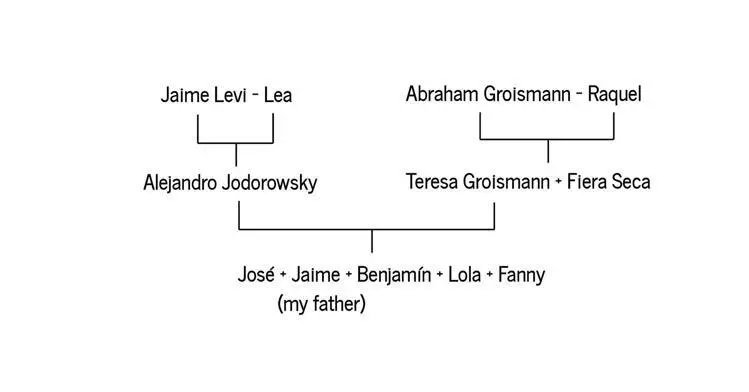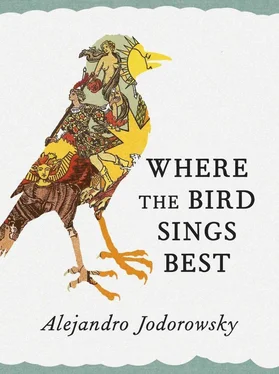Alejandro Jodorowsky
Where the Bird Sings Best
“A bird sings best in its family tree.”
— Jean Cocteau
While all the characters, places, and events in this book are real, the chronological order has been altered. This reality was further transformed and magnified until it achieved the status of myth. Our family tree is the trap that limits our thoughts, emotions, desires, and material life, but it is also the treasure that captures the greater part of our values. Aside from being a novel, this book may, if it is successful, serve as an example that all readers can follow and, if they exercise forgiveness, they too can transform family memory into heroic legend.
— Alejandro Jodorowsky

In 1903 Teresa, my paternal grandmother, got angry: first with God and then with all the Jews of Ekaterinoslav (now Dnipropetrovsk, in Ukraine) who still believed in Him despite the deadly flood of the Dnieper. Her beloved son José perished in the flood. When the house began to fill up with water, the boy pushed a chest out to the yard and climbed on top, but it didn’t float, because it was stuffed with the thirty-seven tractates of the Talmud.
After the burial, carrying all the children she had left, four toddlers — Jaime and Benjamín, Lola and Fanny — who were conceived more out of obligation than passion, she ferociously invaded the synagogue with her husband hot on her heels. She interrupted the reading of Leviticus 19: “Speak to the entire assembly of Israel and say to them—”
“I’m the one who’s going to speak to them!” she bellowed.
She crossed over into the area forbidden to her as a woman and pushed aside the men who, victims of an infantile terror, covered their bearded faces with prayer shawls, silken tallises. She threw her wig to the floor, revealing a smooth skull red with rage. Pressing her rough face against the Torah parchment, she cursed at the Hebrew letters:
“Your books lie! They say that you saved the entire nation, that you parted the Red Sea as easily as I slice my carrots, and yet you did nothing for my poor José. That boy was innocent. What did you want to teach me? That your power is limitless? That I already knew. That you are unfathomable? That I should test my faith by simply accepting that crime? Never! That’s all well and good for prophets like Abraham. They can raise the knife to their sons throats, but not a poor woman like me. What right do you have to demand so much of me? I respected your commandments, I thought of you constantly, I never hurt anyone, I gave my family a holy home, and I prayed as I cleaned, I allowed my head to be shaved in your name, I loved you more than I loved my parents — and you, you ingrate, what did you do? Against the power of that death of yours, my boy was like a worm, an ant, fly excrement. You have no pity! You are a monster! You created a chosen people only to torture them! You’ve spent centuries laughing, all at our expense! Enough! A mother who’s lost hope, and for that reason doesn’t fear you, is talking to you: I curse you, I erase you, I sentence you to boredom! Stay on in your Eternity, create and destroy universes, speak, and thunder, I’m not listening any more! Once and for all: out of my house. You deserve only contempt! Will you punish me? Cover me with leprosy, have me chopped to pieces, have the dogs eat my flesh? It doesn’t matter to me. José’s death has already killed me.”
No one said a word. José wasn’t the only victim. Others had just buried family members and friends. My grandfather Alejandro, from whom I inherited part of my name — because the other half came from my mother’s father, who’s name was also Alejandro — dried with infinite care the tears that shone like transparent scarabs on the Hebrew letters as he bowed again and again to the congregation; his face crimson, he muttered apologies that no one understood and led Teresa out, trying to help her with the four children. But she wouldn’t let go and hugged them so tightly against her robust bosom that they began to howl. A hurricane wind blew in, the windows opened, and a black cloud filled the temple. It was every fly in the region fleeing a sudden downpour.
For Alejandro Levi (at that time our family name was Levi), his wife’s break with Tradition was just one more nasty blow. Nasty blows were an insoluble part of his being: he’d put up with them stoically throughout his life. They were like an arm or an internal organ, a normal part of his reality. He wasn’t even three when the Hungarian maid went mad. She walked into the bedroom where he slept hugging his mother Lea and murdered her with an axe. The hot spurts dyed his naked little body red. Five years later, in an outburst of hatred over the myth that Christian children’s blood was used to make matzoh, a swarm of drunken Cossacks poured into the streets of Ekaterinoslav: they burned the village, raped women and children, and beat Jaime, Alejandro’s father, to a bloody pulp because he refused to spit on the Book. The Jewish community of Zlatopol took him in. They gave him a bed in the yeshiva. There they taught him two things: to milk cows (at dawn) and to pray (for the rest of the day). That milk was the only maternal scent he knew in his childhood, and to feel a feminine caress, he taught the ruminants to lick his naked body with their huge, hot tongues.
Reciting the Hebrew verses was torture until he met the Rabbi in the Interworld. It happened like this: Alejandro davened so much, chanting passages he didn’t understand, that his feet were numb, his forehead boiling, and his stomach filled with an acidity. He was afraid he would gasp like a fish out of water and faint right there in front of his classmates, who understood the texts (unless their fervent expression of faith was nothing more than an act to earn them a good supper). He made a supreme effort, and, leaving his body to its davening, he moved outside himself and found himself in a time that didn’t elapse, in a space that didn’t extend. What a discovery that refuge was! There he could languish in peace, doing nothing, only living. He felt intensely what it was like to think without the constant burden of the flesh, without its needs, without its various fears and fatigues, without the contempt or pity of others. He never wanted to go back, he only wanted to remain in eternal ecstasy.
Piercing the wall of light, a man dressed in black like the rabbis, but with Oriental eyes, yellow skin, and a beard with long, slack whiskers floated next to him.
“You’re lucky, little man,” he said. “What happened to me won’t happen to you. When I discovered the Interworld, there was no one there to advise me. I felt as fine as you do and decided not to go back. A grave error. Abandoned in a forest, my body was devoured by bears. And then, when I needed human beings again, it was impossible to return. I was condemned to wander through the ten planes of Creation without stopping. A sad bird of passage. If you let me plant roots in your spirit, I’ll return with you. And to show my thanks, I’ll be able to advise you — I know the Torah and the Talmud by heart — and you’ll never be alone again. What do you say?”
What do you think this orphan boy was going to say? Thirsty for love, he adopted the Rabbi, who was from the Caucasus and steeped in Kabbalah. And seeking out the wise saints who, according to the Zohar, live in the other world, he got lost in the labyrinths of Time. In those infinite solitudes, he, a contumacious hermit, learned the value of human companionship, understood why dogs always long for their masters. He discovered that others are a kind of sustenance, that men without other men perish from spiritual hunger.
Читать дальше













